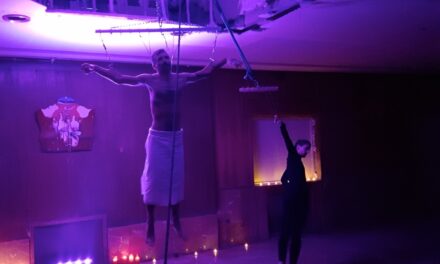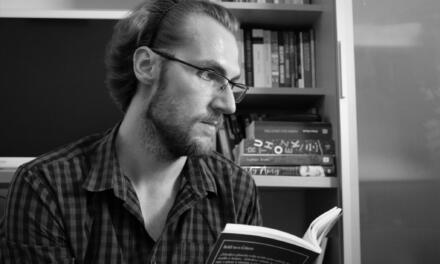Nigerian playwright, Cheta Igbokwe, is a prolific young writer. This I find amazing, especially when I consider that he is also a graduate student. Since the announcement of this talent with his debut play, Homecoming, long-listed for the Nigerian Prize for Literature in 2023, Igbokwe has in two years provided his audience with two other staged plays, Awele, and most recently, Brother-Brother.
Brother-Brother had earlier been named a finalist for the 5th Beeta Playwright Competition, a reputable award in his home country, Nigeria. His latest, Dimkpa, which we expect to see on stage in the near future is also a runner up in the 6th edition of the same prize.
At the heart of Igbokwe’s published plays is the question and interrogation of death and exile, of memory and forgetfulness, of strivings and failed quests. In Homecoming, we encounter a family wrecked by the disappearance of their only child, and in the quest to find this son of theirs, both the son and the father ends up dead, primarily because the parents could not recognise the adult son they lost as a kid.
In Awele, twin brothers who died prematurely were given the opportunity to return to earth, to choose their own destinies; this ability to choose, the ability to determine for themselves, to rewrite their destinies even, became their greatest undoing, resulting in them returning to earth in a way they would have never imagined, raising the question as to whether man can indeed alter his destiny, whether man’s fate on earth is pre-determined by any force, whether man can win in a fight against the Divine, a fight against the inevitable.
Brother-brother can be considered as the third play in this trilogy of sorts, a trilogy of dramatic-philosophical musings on death and survival. The fight against the inevitable, Death, is brought to a deeply philosophical contemplation, which marks a slight divergence from the excitingly entertaining nature of the preceding Awele.
One can imagine that the audience for whom Igbokwe wrote Brother-brother is that of grey-haired professors who understand the workings of the theatre beyond the drums and the dance. Like an audience member said to me during the third night of the production (which was the day I saw the play), “Cheta has gone metaphysical.” Indeed, he has. Not that he has not always been engaging the metaphysical. It just becomes very prominent here.
Ndaa Okenta (Chukwuebuka Eneh) and his brother-brother, Ojemba (Chiedoziealum Samsong), a professor of theatre at Iowa who is down with a cancerous growth, are two brothers who embark on a quest to evade death for as long as they can. They simply wanted to live long, a quest their own father had embarked on earlier before them; a quest that took their father’s life.
Ndaa Okenta, the younger brother who is more aware of the workings of the longevity spell, believes that by killing the magician who casts the spell, the fate that befell their father — who died because he was unaware that the magician who had prepared his spell had revoked it — will not befall them. The magician’s son who took over the trade from his father therefore meets his untimely death after he has prepared and even taught Ndaa Okenta how to prepare the spell.
When Ojemba returns to Nigeria to prepare for his death, Ndaa Okenta convinces him to allow him to prepare the spell for him too. That way, he can overcome cancer and the death it brings. The spell involves tying one’s life to the life of a younger person, and insofar as this younger person lives, the person whose life has been tied to the younger person’s also lives. This is a process that can be repeated many times. Ndaa Okenta, in his fifties, is married to Ifenkili (Ogbue Chidubem), some thirty years younger than he is, to whom he has tied his life. Desperate, Ojemba, allows Ndaa Okenta do same for him and when a fire incident claims Ifenkili, their death is quickened.
In ninety minutes, Cheta crafts conversations, especially between the brothers, and their wives, that takes a magnifying lens to a lot of prevalent issues in the society. Charity and philanthropy are one of those issues. Another is the subjugation of women, and how some women seek to subvert this subjugation by taking agency.
Apart from Ifenkili, who is clearly an enslaved person, tied up to her husband’s bedroom so that no harm can come to her and thus the husband, the play in its actions and inactions echoes the novelist, Buchi Emecheta’s identification of women as “second class citizens.” For example, nothing is known about the brothers’ mother; she is never mentioned. As for their wives, Ifenkili, who is neither the first nor second woman to get married to Ndaa Okenta, is enslaved, held hostage, without the knowledge of her family—a family content with receiving material gifts in exchange for their daughter.
The person in whose case the philanthropic nature of Ojemba is shown, instead of merely referred to, is a poor woman with an ailing child, characterised by Ndaa Okenta as one of those poor women who can’t stop giving birth.
Indeed, the only woman with some sort of agency in the play is Oriaku (Ijeoma Orji), the wife of Ojemba, and even her agency is manifested, not in a positive light, but in her elaborate plans to con her husband of the wealth he wishes to donate to charity. It seems that the play has the task of examining gender inequality as its secondary engagement.
The first thing the audience notices is the stage/scenic design. Ojemba’s sitting room especially is so designed to befit his status. One cannot help but appreciate the level of effort put into setting that stage, which includes some new electrical installations and installation of window blinds, that someone familiar with the productions at the University of Nigeria knows is new.
The props used also helps to accentuate it. Even though the titles in Ojemba’s bookshelf are not decipherable to the public, by their volume, one knows it is the kind of books in an academic’s house. Especially one who is considered an intellectual royalty. The wine cabinet in Ojemba’s “private” parlour which is absent in his main parlour lends credence to the fact that it is only for special visitors, worthy of being treated to such seemingly expensive wines.
Another set of props that works wonders here in the mind of the audience is the variety of fruits found on Ojemba’s dining table. Apart from the fact that fruits are expensive, but even in rural areas where they are grown and thus cheap, there is a set of people stereotyped with taking the consumption of fruits seriously, and these are the educated middle class and elites who never stops talking about their health benefits to the poor man who just wants a solid food that can sustain him in his hard labour.
The directors, Richard Umezinwa (technical director; he was also the scenic designer for Awele), Roland Odo (artistic director), and Ugochukwu Ugwu (artistic director, also directed Awele) were at home with the script they were producing. They understand the assignment, they see what the playwright sees, and this is shown also in the kind of songs selected for the orchestra. The orchestra produces this sort of subdued sounds, portending danger, but most especially grief and when the chorus members join in low tones, the lyrics filter in, announcing the inevitability of death and man’s hopelessness, try he as he might, in the face of death.
The actors and actresses were in their elements, embodying fully their characters. We see those professorial pronouncements in Ojemba (Chiedoziealum Samsong), especially when he talks about keeping a great legacy and how he points out his younger brother’s performative sorrow — being himself a professor of theatre. Even when he cedes this professorial wisdom, out of desperation, to Ndaa Okenta (and he indeed did say something about being wrong as to who possessed their father’s wisdom between him and Okenta), Samsong is able to show, by his self-carriage on the stage, that beneath the academic qualifications and wealth, still lies a human being with the primal goal of survival.
I must make a special mention of Chukwuebuka Eneh who played the character, Ndaa Okenta. In his perfect embodiment of this character, Eneh was able to infuse humour into an otherwise serious and philosophical musing. The scene where he was invited to a meal by Oriaku marks the height of his comedic personality. It is also a very relatable one. It happens in an everyday Nigerian home whenever a financially less buoyant visitor visits a family more financially stable and is invited to the dining table. The code is to feign not being really interested in the food, while expertly securing same food.
Eneh as a talented actor makes the audience see how funny such encounters can be to the observer. Eneh reminds me of the characters Ehi and Mgbada (the twins in Awele) and how they were able to also inject humour in the sad reels of events in Awele. This begins to mark a pattern in Igbokwe’s plays: theatre of the humorous deep.
The lighting of Brother-brother comes off as another excellent part of the play, especially on how it is able to inform the audience of time (the bedroom scene with Ndaa Okenta and Ifenkili shows perfectly what a candle-lit night in a Nigerian bedroom, belonging to a relatively poor man looks like) and to set the scene’s mood too. Its transitioning from one scene to the other is also seamless, evident mostly in how the light is used to bridge between Ojemba’s parlour where he welcomes all visitors and his “private” parlour where special visitors are entertained.
Two instances that are the hallmark of costume and makeup manager, Chinecherem Ezema’s skill is in the dressing of Ojemba and Ndaa Okenta, and their makeup. When one compares the dressing of these brothers, they are both adorning sparkling clothes, Ojemba’s being white in colour. It shows two brothers who do not compromise on their neatness, and this may be traced to their shared upbringing. But even in the common neatness, class is clearly marked.
While Ojemba’s clothes are of visibly high quality, Okenta’s is not just of a lower quality but has indeed seen better days, a fact announced by the tears on it. What solidifies Okenta’s sufferings due to his economic disadvantaged position, already established by the dialogues, are his grey hairs which rival that of Ojemba’s, even though there are reasons to believe that Ojemba is much ahead of him age-wise.
While it is known that some health conditions, or even random genetic makeups, cause some people to grey at a faster rate than others, it is also known that stress can be a causative factor. Armed with what we already know about Okenta, we are safe to assume that it was the stress his economic class induced in him that causes the greying of his hair — a tiny detail indeed, but not missed by the makeup manager.
Cheta Igbokwe’s Brother-brother is the play to see. The dance of the three masquerades there, correlating with the death of the three men, two brothers and their father, reminds us that death remains inevitable. And that instead of looking for clever and not-so-clever ways of evading it, we should seek for ways to make the most of our lives, which was the original quest Ojemba abandoned in search of a longevity that shortens.
For the playwright who recently lost his mother, Cheta Igbokwe’s Brother-brother is not just didactic, it is also biographical.
Brother-brother, co-directed by Richard Umezinwa, Roland Odo and Ugochukwu Ugwu featuring Chiedoziealum Samsong and Chukwuebuka Eneh premiered at the University of Nigeria, Nsukka, Arts Theatre on 6th of March, 2024 and ran for three consecutive nights.
This article appeared in The African Theatre Magazine on March 16, 2024, and has been reposted with permission. To read the original article, please click here.
This post was written by the author in their personal capacity.The opinions expressed in this article are the author’s own and do not reflect the view of The Theatre Times, their staff or collaborators.
This post was written by Ugochukwu Anad!.
The views expressed here belong to the author and do not necessarily reflect our views and opinions.






















